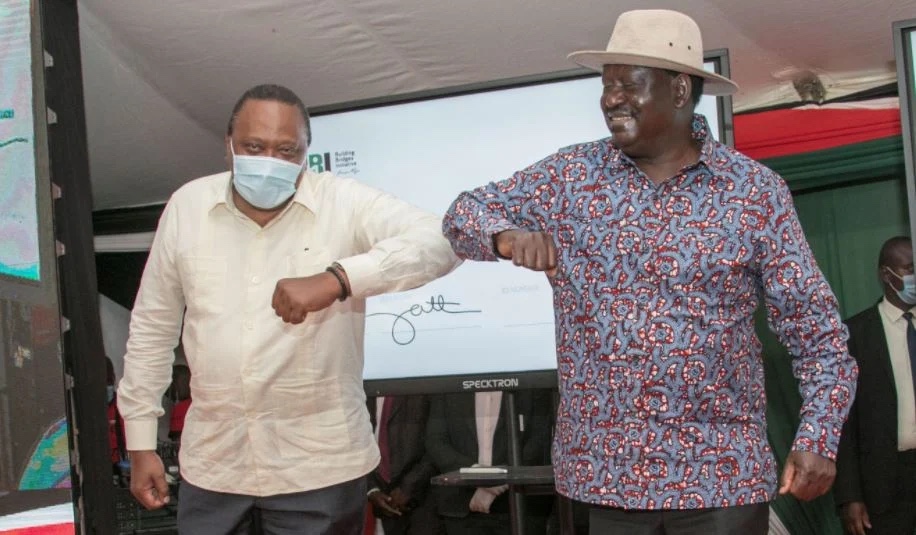KEY POINTS:
- Raila Odinga was caught off guard with some of the amendments which were made to the final report of the Building Bridges Initiative (BBI).
- The 2020 amendment bill dropped some of the initial contentious proposals that had generated political heat.
- Raila rooted for political parties to nominate IEBC commissioners, the same script that has been part of his reforms agenda.
- Raila hailed the 2002 General Election presided over by 20 commissioners picked by political parties under the Inter-Parties Parliamentary Group (IPPG) arrangement.
ODM leader Raila Odinga was caught off guard with some of the amendments which were made to the final report of the Building Bridges Initiative (BBI).
The 2020 amendment bill dropped some of the initial contentious proposals that had generated political heat.
These including political parties nominating Independent Electoral and Boundaries Commissioners and the establishment of the police council.
The new bill also makes no mention of plans to kick out the current IEBC commissioners led by Wafula Chebukati.
Interestingly, Raila appeared caught off guard by some of the contents of the final bill. He had hailed the BBI process for allowing political parties to nominate IEBC chiefs.
That proposal was expunged from the final bill, raising questions about whether Raila was briefed on the changes.
In his speech, Raila rooted for political parties to nominate IEBC commissioners, the same script that has been part of his reforms agenda.
Raila hailed the 2002 General Election presided over by 20 commissioners picked by political parties under the Inter-Parties Parliamentary Group (IPPG) arrangement.
He said the deal had guaranteed the “fairest election” in Kenyan history.
“There is nobody who is neutral. Even if you give the Pope a ballot, he will go out there and vote for somebody…they [commissioners] will be counter-checking each other and political parties will consult with each other,” Raila said.
Raila said commissioners appointed by parties will monitor each other, saying in many countries “that is the formula because political parties are the actors.”
“Those of you who have been around will agree that the most fair elections were held in 2002. The 10 commissioners appointed by [President Daniel] Moi were being counter-checked by those appointed by opposition parties,” he added.
The new bill seeks to create 70 new constituencies distributed in at least 28 counties. It allows for nomination of women to Parliament and county assemblies but only those who stood for election.
In fact, preference would be given to those women who received the highest number of votes, ending the culture of tokenism and rewarding ‘girlfriends’.
The Constitution of Kenya (Amendment) Bill, 2020 also proposes enhanced Senate powers and gives MCAs an opportunity to serve in the coveted County Executive Committee posts.
The proposal gives the President powers to appoint at least 14 Deputy Ministers from among members of the National Assembly to deputise Cabinet ministers.
Also struck out from the bill is a provision establishing a special status for Nairobi county.
This means that the next governor will assume full functions provided by law after the term of the Nairobi Metropolitan Services ends.
The bill also dropped the elevation of the Independent Police Oversight Authority into full-fledged Commission despite initial excitement that it would have been a big lead forward in the oversight of Police.
The Senate fell short of being elevated into the Upper House with sweeping mandate in the oversight of all county Revenue including own source income as well as vetting powers.
The Senate will now vet and approve the Controller of Budget, the Youth Commission and the Judiciary Ombudsman as part of its additional mandate.
Current IEBC chairman Wafula Chebukati and commissioners Boya Molu and Abdi Guliye may get a lifeline for probably a negotiated exit after the referendum since the final bill dropped the proposal to subject them to fresh vetting.
The IEBC battle had triggered political heat among key leaders with Deputy President William Ruto leading the camp that has been opposing the nomination of the commissioners by political parties.
Ruto and a section of leaders including the church had opposed the move to abolish the National Police Commission and replacing it with a police council.
The police council would have been chaired by the Cabinet Secretary for Interior.
The BBI technocrats however retained the Judiciary Ombudsman despite uproar that its creation and appointment by the President would erode independence of the Judiciary.
The architects of the bill also moved to appease members of the County Assemblies through a provision that would compel governors to appoint at least half of the CEC’s from among MCAs.
There's no story that cannot be told. We cover the stories that others don't want to be told, we bring you all the news you need. If you have tips, exposes or any story you need to be told bluntly and all queries write to us [email protected] also find us on Telegram

